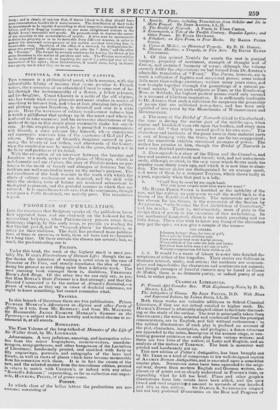PICCIOL A, OR CAPTIVITY CAPTIVE.
Tins romance is it philosophical novel, which narrates, with the indescribable felicity of manner that seems peculiar to French writers, the conversion of an atheistical Count to some sort of be- lief, through the instrumentality of a flower, a fellow prisoner, and his daughter. Count Chantey is a noble of the old regime, who has vainly tried every pleasure and many studies in search of something to interest him, and w ho at last, plunaing into politics, and plotting against Napoleon, is detected and sent to a state prison. Here the weariness of solitary confinement induces him to watch a gillitlower that springs up in the court-yard where he is allowed to take exercise ; and his successive observations of the marks of design in this single plant eventually shake his see:ei- dim. At this auspicious period, he is permitted to communicate with Girardi, a state prisoner like himself, whese experience awl arguments convince him of the existence of God and Pro- vidence. The exeitions of Girardi's daughter succeed in pro- curing the lilierty of her father, and afterwards of the Count ; when the conclusion may be imagined in the gross, though net in the limey and prettiness of its detail.
Will the exception of an interview between the heroine and Josephine at a mock review on the plains of Marketers which is melodramatic awl out it place, the story of' Pieeio/a makes no pre- tension to the merit of variety and changes of fortune; but the incidents are well contrived to carry on the author's purpose. The real excellence of the book censists in the truth with which the effects of' solitary confinement are depicted, and the skill with which the striking facts of botany are rendered subservient to theological argument, end the graceful manner in which they are enfleced. It is snperiltions to oleerve that the sentiments, though sometimes a lectle theatrical, are morally pure. The translation is good.


























 Previous page
Previous page